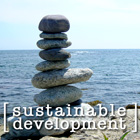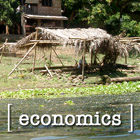
|
DOWN TO THE LAST DROP: THE COMING RIPPLE EFFECT OF THE PROJECTED OIL PEAK Petroleum is a finite resource. It is a "fossil fuel" because it is a complex substance generated by nature over tens of millions of years, a sticky, prolonged, combustible phase in the decomposition of organic material once stored in countless prehistoric organisms. It is energy rich because of the high organic content compressed into its dense molecular structure over a time too long for us to imitate in a controlled environment. Petroleum is "fossil" because we cannot replace it, because it falls to us from time immemorial, because it is a relic of billions of different life-forms so far and so long eroded we cannot distinguish their contribution. It is a source without a source, its progenitors are long gone and we can only burn what we find, until it is gone. In Plan B 2.0, a new edition of his monumental synthesis of ecological and economic research, Lester Brown explores the foreseeable and impending consequences of "Peak Oil". This is the moment when extant reserves of crude oil are no longer enough to sustain the global economy's annual production levels, and production will no longer be able to match increases in demand. Economists have long reckoned with this foreseeable exhaustion of a finite resource, but now they are beginning to reckon with the apparent and possibly sudden and widespread shock it will provoke in global markets and at deep levels across national economies. Brown (21) projects the moment may pose such dramatic economic, political and lifestyle changes that future historians "may well distinguish between before peak oil (BPO) and after peak oil (APO). The reasons for alarm are complex and well-founded. Petroleum is used, of course, not only for automotive fuel and transport, but for electricity generation and home heating, as well as industrial fuel and for its vital refinement into useful substances like plastics. But its role in driving agricultural efficiency and expansion, in automated harvesting machinery and in motorized pumps for extracting huge amounts of groundwater, is often overlooked, both by the "end-user" and by the markets that speculate on its availability and its value. It is projected that costs for locating and extracting the increasingly scarce remaining petroleum will escalate sharply, making subsidies for doing so unsustainable. A permanent disruption in the supply of cheap oil means a worrying and widespread threat to the world's food-production and distribution systems. What's more, many oil-rich economies, which depend almost exclusively on that resource to support buying power on international markets, are among the most water-poor. The very ability of these food-import-dependent economies to import water or grain —which equates to importing water at 1,000 times the rate, and so is preferable— will be severely undermined by the so-called "end of oil", or even by the beginning of its decline. Some nations, like Brazil and the US, are spending a lot of time and energy to develop a crop-based ethanol alternative to gasoline, but that planting consumes valuable cropland. Whether or not developed economies shift to bio-fuels —like corn-, sugarcane- or soya-based ethanol— develop rich renewable alternatives to petroleum, any failure of water-poor states to plan for oil scarcity will leave tens or even hundreds of millions of people with food shortages. It is not clear whether such devastating impact would be felt immediately and without warning or whether it would evolve over time as world grain stocks are depleted and water treaties fail, but Brown warns of a "depletion psychology" which will soon tempt oil companies to cut production and drive prices up in an effort to extend the life of a diminishing supply. This would bring forward the economic shockwave of any severe oil shortage, making peak oil itself the worrying event. Princeton University geologist and oil industry expert Kenneth Deffeyes opined in his 2005 book Beyond Oil "the peak will occur in late 2005 or in the first few months of 2006". Other prominent experts project a 2007 peak. Rapid increases in the price of crude oil and of gasoline hints at diminished supply, and expert observers have noted there is no sound evidence at present to support Saudi claims that more oil remains underground than the kingdom has pumped so far. The Economist notes: "The kingdom has produced around 100 billion barrels, and claims to hold 260 billion more. This figure has been widely accepted, yet the last time outsiders estimated Saudi reserves, before the nationalisation of the oil industry in the 1980s, they were reckoned at less than half this amount." If new discoveries and new sources do not bring enough petroleum online to cover the rise in world demand and the decline in output from existing wells, then we will reach and pass by the peak in oil production, and all the related effects and events will face global markets and local economies alike. Economists project that drastic declines in foodstocks or water supplies, revealed or brought about by oil scarcity, could lead to civil unrest. Bolivia, where according to Development and Peace [PDF], a Catholic organization, citizens in Cochabamba province spend about 1/3 of annual income on water, has seen numerous civil conflicts, ousted governments and flare-ups of factional violence, due to its population's economic desperation. For an example among advanced industrial economies, France has faced a stunning and nationwide wave of arson and violence, triggered by 2 deaths, but fueled mostly, it is thought, by economic marginalization and the scarcity of employment —a commodity less basic than food or water— and that violence has apparently spread to other neighboring countries. Tushaar Shah, managing the International Water Management Institute's operations in Gujurat, says of water scarcity "when the balance bursts, untold anarchy will be the lot of rural India." (45) A global economy dependent on oil to meet built-in price expectations for mobility, industry and food production and distribution, is clearly vulnerable to the social, political and economic instability that would stem from reduction in availability of these, should oil suddenly become prohibitively expensive. But alarm is likely not the most economic or useful choice. There exists a very real possibility that the crises associated with declining oil reserves, varied and potentially feeding off one another, can be dampened or averted by sound resource management and planning. Moving toward renewable resources, not beholden to finite volumes or costly extraction methods, ensuring that advances in new technologies fill the gaps left open by disappearing oil stocks. [s] |
|||||||||||||||||||||
|
||||||||||||||||||||||







